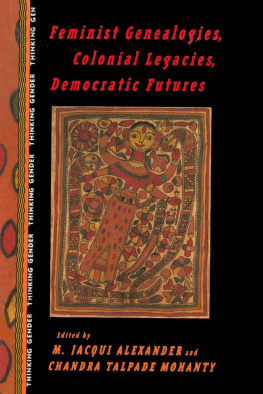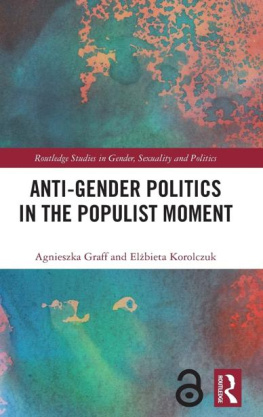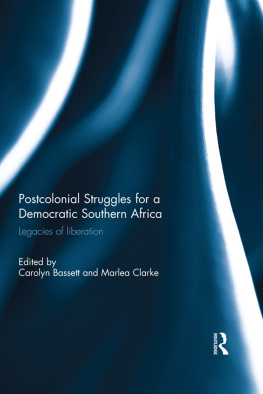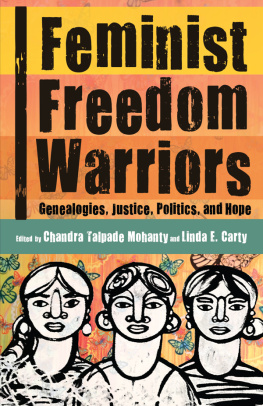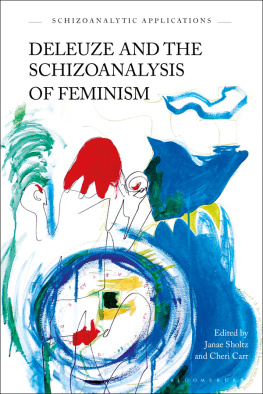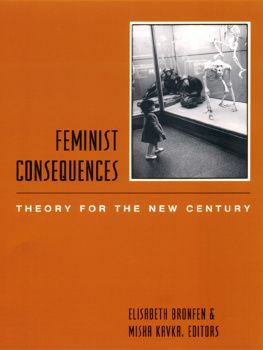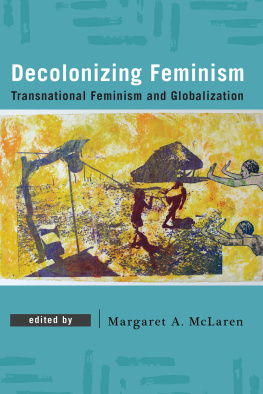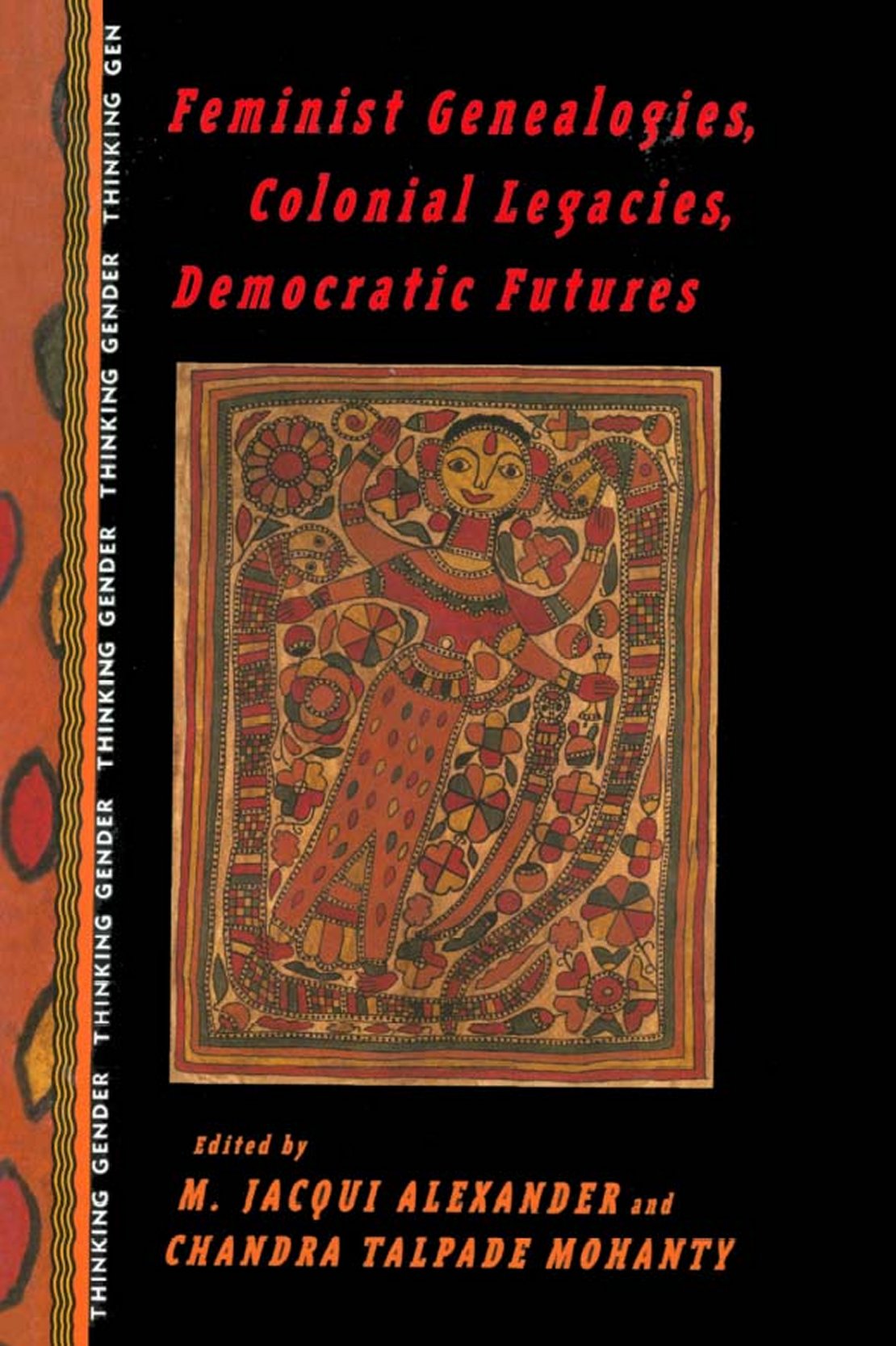Feminist Genealogies,
Colonial Legacies,
Democratic Futures
Thinking Gender
Edited by Linda Nicholson
Also published in the series
Feminism/Postmodernism
Linda Nicholson
Gender Trouble
Judith Butler
Words of Power
Andrea Nye
Femininity and Domination
Sandra Bartky
Disciplining Foucault
Jana Sawicki
Beyond Accommodation
Drucilla Cornell
Embattled Eros
Steven Seidman
Erotic Welfare
Linda Singer
Materialist Feminism and the Politics of Discourse
Rosemary Hennessy
An Ethic of Care
Mary Jeanne Larrabee
Feminist Epistemologies
Linda Alcoff and Elizabeth Potter
Gender Politics and Post-Communism
Nanette Funk and Magda Mueller
Engenderings
Naomi Scheman
Feminist Theory and the Classics
Nancy Rabinowitz and Amy Richlin
Postmodern Revisionings of the Political
Anna Yeatman
Moral Dilemmas of Feminism
Laurie Shrage
Subjection and Subjectivity
Diana T. Meyers
Feminist Contentions
Seyla Benhabib, Judith Butler, Drucilla Cornell, and Nancy Eraser
Feminists Read Habermas
Johanna Meehan
Sacrificial Logics
Allison Weir
Feminist Genealogies,
Colonial Legacies,
Democratic Futures
Edited by
M. Jacqui Alexander
and
Chandra Talpade Mohanty

This edition published 2012 by Routledge
Routledge | Routledge |
Taylor & Francis Group | Taylor & Francis Group |
711 Third Avenue | 2 Park Square |
New York, NY 10017 | Milton Park, Abingdon
Oxon OX14 4RN |
First published by
Published in 1997 by
Routledge
29 West 35th Street
New York, NY 10001
Published in Great Britain by
Routledge
11 New Fetter Lane
London EC4P4EE
Copyright 1997 by Routledge
All rights reserved. No part of this book may be reprinted or reproduced or utilized in any form or by any electronic, mechanical, or other means, now known or hereafter invented, including photocopying and recording or in any information storage or retrieval system, without permission in writing from the publishers.
Library of Congress Cataloging-in-Publication Data
Feminist genealogies, colonial legacies, democratic futures /edited by M. Jacqui Alexander and Chandra Talpade Mohanty.
p. cm.
Includes bibliographical references and index.
ISBN 0-415-91211-3 (cloth). - ISBN 0-415-91212-1 (pbk.)
1. FeminismDeveloping countries. 2. WomenDeveloping countriesSocial conditions. I. Alexander, M. Jacqui. II. Mohanty, Chandra Talpade, 1955-.
HQ1870.9.F45 1995
305.42'09172'4-dc20
95-36341
CIP
Contents
This book is dedicated to Audre Lorde
in honor of her life and work
Preface
Bringing this book into the world has been a profoundly collaborative process, both intellectually and politically. In collaborating with the authors, each other, and other sisters and comrades over the years, we have come to know the critical importance of figuring out our communities of belonging, and therefore those communities to which we are accountable. We do not inherit our intellectual neighborhoods (a term we borrow from Toni Morrison); we consciously build them. So our working process has involved actively imagining, crafting, and sustaining these neighborhoods where dissent and struggle have been as important as commitment to a common vision. This challenge has been no less true for our own work together, striving as we have over the last nine years to honor our commitments to intellectual and emotional risk-taking and to clarity, honesty, and friendship.
In dedicating this book to Audre Lorde, we revisit the ways in which her life's work and her presence in the world taught us the necessity of accountability in envisioning, forming, and maintaining community. For us this means becoming attentive to and accountable for the work that we are called upon to do and scrutinizing the very terms and ways in which we gain self- and community definition. We have come to know as well that the task of devising critical analytic tools and taking responsibility for them must also involve taking on the challenge of crafting more nuanced and accurate ways of understanding the world. Our involvement in a transformative and transforming collective project of social justice has taught us about what and how much is at stake in producing liberatory knowledges that enable collective and self-determination for colonized peoples. After all, we develop these tools in order to better understand and engage with the world, and in order to bring about revolutionary change.
Coming to know that we have a stake in producing liberatory knowledge is neither self-evident nor easy. This too requires struggle, risk-taking, and commitment to learning. We continue to learn from our sisters and comrades how to have a stake in dunking in this way, and the ethical risks and commitments that accompany this work. For walking this political, intellectual, and spiritual path with us over the years we thank Gloria I. Joseph, Papusa Molina, Andre Nicola McLaughlin, Linda Carty, Brenda Joyner, Mab Segrest, Sharon Day, Barbara Herbert, Elizabeth Minnich, Leslie Hill, Si Kahn, Zillah Eisenstein, Avtar Brah, Cathie Dunsford, Jinny Chalmers, and Satya Mohanty. We choose to anchor the politics and ethics of our thinking in the knowledge required to understand the stakes that accompany struggles for decolonization in the late twentieth centurystakes that dominant ideologies would reframe and dismiss as moralistic or purely self-interested.
Jacqui has learned much from different people over the years; neighborhoods, as you know, are never, ever uniform. She is humbled to have found a spiritual community which believes in the interconnectedness of all dungs; in the truth that there are several paths to knowing; and in the indispensability of spiritual moorings. None of this intellectual work would have been possible without the spiritual guidance and support of La Negra Haiti, Teresa Ramirez, Wilma Guzman, Myrna Bain, and the United Cultural Society; the wisdom, courage, and love of Alourdes Kowalski (Mama Lola) and Georgette Champagne (Maggie), who is also a sister. Jacqui deeply appreciates the intellectual guidance and critique of an overlapping community of colleagues, friends, and teachers: Raul Ferrara-Balanquet; colleagues at the New School for Social Research Gary Lemons and Jerma Jackson, whose friendship provided the ground for us to become engaged critics of each other's work; Geeta Patel, who was there to help provide language in those spaces that were difficult to theorize; and Paul Joseph and Rosemary C. R. Taylor, for being early intellectual anchors in the United States. The practice of politics is not easy in these dangerous times, so plenty of respect goes to those whose courage and conviction have not been daunted and who continue to inspire us all: Sharon Day, Mab Segrest, and Lisa Albrecht, whose commitment reflects itself in a combination of collaboration, patience, optimism, and hope; Cathy Cohen, Katherine Acey, Becky Johnson, Angela Bowen, Joan French, and Angela Robertson; the Caribbean Association for Feminist Research and Action; SISTREN; participants in the National Lesbian and Gay Taskforce Progressive People of Color Summit; the recent participants in the United States Urban/Rural Mission network discussions on sexuality and homophobia, initiated by Mab Segrest; and the Black Nation/Queer Nation? conference and ongoing organizing committee. Finally, Jacqui is indebted to Jinny Chalmers and Maya Alexander, both witnesses to the birth of this project. Jinny has been companion and friend, nurturing Jacqui in immeasurable ways, living and teaching the meaning of balance through struggle. Maya, their daughter, has sustained far too many projects for her years. Her curiosity, elegance, and humor are a source of ongoing challenge, inspiration, and joy.

